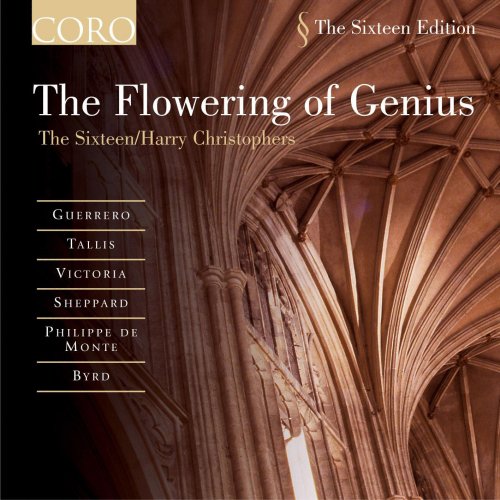
The Sixteen, Harry Christophers - The Flowering of Genius (2001)
BAND/ARTIST: The Sixteen, Harry Christophers
- Title: The Flowering of Genius
- Year Of Release: 2001
- Label: Coro
- Genre: Classical
- Quality: FLAC (tracks)
- Total Time: 01:13:44
- Total Size: 296 Mb
- WebSite: Album Preview
Tracklist:
1. Ave Virgo sanctissimaT 04:48
2. Suscipe quaesoT 09:48
3. O vos omnesT 05:07
4. Vere languoresT 04:52
5. O Domine Iesu ChristeT 03:41
6. Mass Puer natus: Agnus DeiT 08:57
7. Super flumina BabylonisT 05:01
8. Vadam et circuiboT 08:54
9. Laudate Dominum omnes gentesT 03:10
10. Verbum caroT 06:56
11. Super flumina BabylonisT 06:14
12. Quomodo cantabimusT 06:16
Performers:
The Sixteen
Harry Christophers
1. Ave Virgo sanctissimaT 04:48
2. Suscipe quaesoT 09:48
3. O vos omnesT 05:07
4. Vere languoresT 04:52
5. O Domine Iesu ChristeT 03:41
6. Mass Puer natus: Agnus DeiT 08:57
7. Super flumina BabylonisT 05:01
8. Vadam et circuiboT 08:54
9. Laudate Dominum omnes gentesT 03:10
10. Verbum caroT 06:56
11. Super flumina BabylonisT 06:14
12. Quomodo cantabimusT 06:16
Performers:
The Sixteen
Harry Christophers
This Anglo-Spanish disc conspicuously explores the diverse fissures, social, political and religious, that rent England asunder in the middle of the sixteenth century whilst Spain – stable, increasingly wealthy and pragmatically political – expanded its global Empire ever further. Whilst English composers generally sought to conform to the prevailing orthodoxy – principally the crude simplicities of homophonic settings under Edward VI – the cosmopolitan Spaniards travelled widely and wrote with sweeping polyphonic mastery.
Francisco Guerrero spent most of his working life in Seville and was widely published by a continental press quicker off the mark than their English counterparts in disseminating works in print – in England the first printing of Latin Church music wasn’t until 1575. Guerrero’s work – his most famous – is a superbly entwined expressive compound of melodies lasting barely four and a half minutes. Victoria’s six pieces – moving, reverential motets – employ extraordinary sophistication of imitation and rhythm. O vos omnes has what sleeve note writer Martyn Imrie tellingly calls quasi-chordal progressions and it is indeed remarkable for the infinitely subtle diminutions of line and tone that inform the work – as volume is withdrawn to magical effect. The Sixteen are now expert proponents of Victoria’s music and are raptly inside his unique syntax.
The English composers don’t wither in comparison with their august Spanish contemporaries. Tallis’ non-liturgical Suscipe quaeso is a powerful and passionate statement that gathers increasing reserves of intensity and concentration as the motet develops – the second part is almost overwhelming in its trenchantly concentrated imitative effects and homophony. By comparison Verbum caro by the relatively prolific John Sheppard is much more English in feel than his fellow countryman Tallis’ Agnus Dei from the Puer natus mass – itself conjecturally written for the Chapel Royal and Spanish Capella Real to perform jointly. The Tallis lacks the high treble parts so characteristically English; Sheppard, by contrast, is in voice distribution, stress and rhythm more of a native setting and deeply accomplished. The final two pieces are of some musico-historical significance. Flemish born but English domiciled Philippe de Monte sent William Byrd a double choir motet, Super flumina Babylonis. The Catholic Byrd’s response was a not very subtly coded one of religious defiance, Quomodo cantabimus, but one still imbued with great lyricism and commensurate depth.
With an introduction by Harry Christophers and good notes by Imrie, Latin texts and translations, this is another in the increasingly long line of The Sixteen’s consummate productions.
Francisco Guerrero spent most of his working life in Seville and was widely published by a continental press quicker off the mark than their English counterparts in disseminating works in print – in England the first printing of Latin Church music wasn’t until 1575. Guerrero’s work – his most famous – is a superbly entwined expressive compound of melodies lasting barely four and a half minutes. Victoria’s six pieces – moving, reverential motets – employ extraordinary sophistication of imitation and rhythm. O vos omnes has what sleeve note writer Martyn Imrie tellingly calls quasi-chordal progressions and it is indeed remarkable for the infinitely subtle diminutions of line and tone that inform the work – as volume is withdrawn to magical effect. The Sixteen are now expert proponents of Victoria’s music and are raptly inside his unique syntax.
The English composers don’t wither in comparison with their august Spanish contemporaries. Tallis’ non-liturgical Suscipe quaeso is a powerful and passionate statement that gathers increasing reserves of intensity and concentration as the motet develops – the second part is almost overwhelming in its trenchantly concentrated imitative effects and homophony. By comparison Verbum caro by the relatively prolific John Sheppard is much more English in feel than his fellow countryman Tallis’ Agnus Dei from the Puer natus mass – itself conjecturally written for the Chapel Royal and Spanish Capella Real to perform jointly. The Tallis lacks the high treble parts so characteristically English; Sheppard, by contrast, is in voice distribution, stress and rhythm more of a native setting and deeply accomplished. The final two pieces are of some musico-historical significance. Flemish born but English domiciled Philippe de Monte sent William Byrd a double choir motet, Super flumina Babylonis. The Catholic Byrd’s response was a not very subtly coded one of religious defiance, Quomodo cantabimus, but one still imbued with great lyricism and commensurate depth.
With an introduction by Harry Christophers and good notes by Imrie, Latin texts and translations, this is another in the increasingly long line of The Sixteen’s consummate productions.
As a ISRA.CLOUD's PREMIUM member you will have the following benefits:
- Unlimited high speed downloads
- Download directly without waiting time
- Unlimited parallel downloads
- Support for download accelerators
- No advertising
- Resume broken downloads


